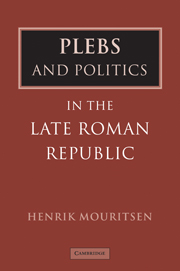1 - Introduction: ideology and practice in Roman politics
Published online by Cambridge University Press: 22 September 2009
Summary
After years of relative neglect the role of the people in Roman politics now attracts considerable interest among ancient historians. A wide range of new interpretations has been presented, and at the root of this interest lies a rediscovery of the fundamental paradox, which is the Roman political system itself. On the one hand, the Roman people wielded tremendous, almost unlimited powers. Their institutions controlled legislation, declarations of war and the appointment of all state officials; they were continuously consulted by their leaders and kept informed through public meetings. On the other hand, Rome was also an aristocratic society, where the elite controlled vast economic resources and monopolised public office, political, military and religious. The senate's influence was overwhelming. It embodied all political experience and religious authority in the Roman state, a position further boosted by its successful leadership during the conquest of Italy and the Mediterranean. This ambiguity has resulted in widely different assessments of the nature of Roman politics, some of which can be traced all the way back to ancient writers. Thus, according to Dio, 36.43.3, Caesar ‘courted the good-will of the multitude, observing how much stronger they were than the senate …’ Sallust, on the other hand, claimed that the affairs of the state were decided by ‘paucorum arbitrio’, because ‘plebis vis soluta atque dispersa in multitudine minus poterat’, Iug. 41.6.
- Type
- Chapter
- Information
- Plebs and Politics in the Late Roman Republic , pp. 1 - 17Publisher: Cambridge University PressPrint publication year: 2001



